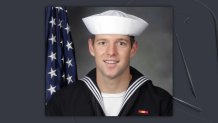There’s no doubt the Navy SEALs have been a point of pride for the U.S. Navy and our local community. After all, the elite military operators train and live in San Diego County.
The SEALs have been involved in some of the most high-profile missions, like the capture of Osama Bin Laden, and hundreds of even more dangerous classified operations we’ll never hear about.
It’s no wonder that it’s a rare honor to join their elite ranks, which few can. The process SEALs use to select candidates is remarkably tough and designed that way to choose only commandos with the highest mental and physical toughness they will need in the field.
But a New York Times article reports the U.S. Navy has now started an independent investigation of the SEALs’ rigorous selection course after the death of a sailor, who was reported to have performance-enhancing drugs among his personal effects. And according to the report, other candidates trying to make the team did, too.
Get San Diego local news, weather forecasts, sports and lifestyle stories to your inbox. Sign up for NBC San Diego newsletters.
Kyle Mullen was a former Yale football captain, described as smart, talented and athletic. “My son and I, he was truly my best friend,” said Regina Mullen. “He was a very jolly soul and fun. And you know, we both liked to exercise and do fun things.”

Regina Mullen says Kyle was also very motivated to become a SEAL.
Local
“The SEAL selection course was way harder than he, and I think most of the people who showed up there anticipated,” said New York Times reporter Dave Phillips. “The first time he tried it he lasted a day and he landed in the hospital with a heat stroke.”
Mullen, 24, tried again and, this time, lasted three weeks in the selection course called Basic Underwater Demolition/SEALs, or BUD/S, which takes place in Coronado. He even made it through Hell Week, the toughest part of the course.

“He would never raise his hand and say he needed to go to medical,” Mullen’s mother said. “They were teaching the men that that’s a sign of weakness.”
The Navy began investigating Mullen’s death.
“In his car, they find performance-enhancing drugs, and right away that starts a larger inquiry because if one student was doing drugs, maybe others were,” said Phillips.
Mullen’s mother says her son’s toxicology report was negative for performance-enhancing drugs. But SEAL commanders decided to drug test other candidates.
“When the investigation starts, they basically give everybody a urine test that is there, and dozens of guys, about 40, test positive,” Phillips said. “And it’s for all kinds of things, testosterone and also some little-known unregulated supplements called SARMs.”
In its reporting, the New York Times interviewed candidates who suggested some sailors are trying to dope their way through selection because the brutal course has gotten even tougher.
“They felt it had gotten so hard that people felt they couldn’t get through it without doping, without using drugs,” Phillips said.
Ed Hiner is a retired Nacy SEAL Lieutenant Commander who also oversaw some Hell Weeks at BUD/S. “First of all, every SEAL, when you ask what class they were in, every person thinks their class is the hardest. They think their training is harder,” said Hiner.
Hiner, like many SEALs, says the selection process has always been unforgivingly difficult, solely to select the few elite sailors who can perform the military’s toughest missions.
“When a candidate gets to that training, they sign a written order of all the substances they can not use and they swear an oath not to use them,” Hiner said. “And it’s always going to be a problem because, I mean, we try as well as we can to hold these guys under a microscope… These guys would do almost anything to get through training. We know that so we watch them as heavily as we can.”
Hiner disputes that the BUD/S selection course is tougher now than before. “It’s not getting harder. It’s a little bit more realistic than it used to be which means it’s not as abusive as it used to be. So in fact it’s not actually getting harder.”
The Navy says it’s made many changes over the years meant to improve safety and increase graduation rates, including always having medics available, and during Hell Week training, present.
Although the Navy didn’t confirm or deny when NBC 7 asked, according to the New York Times, since the death of Mullen, the following changes have been made:
- The course has clamped down on pre-dawn workouts with heavy packs and runs
- Six hours of sleep are allowed nightly except during Hell Week
- Outside auditors have been brought in to monitor instructors
As for the candidates’ health, a Naval Special Warfare spokesperson told NBC 7 that candidates will now get heart screenings, be given an antibiotic at the start of the course to help prevent pneumonia and will be medically monitored longer after Hell Week.
As for eliminating doping, the spokesperson told NBC 7 that SEAL leaders want to expand drug testing of the candidates, but won’t have authority to do so until Navy brass gives the okay.
As far as the investigation into Mullen’s death, the Navy told us it is being finalized and reviewed. At this point, the Navy has not commented on whether performance-enhancing drugs (PEDs) were found in his system.
The Navy couldn’t tell us when its investigation into the use of PEDs among SEAL candidates would be completed.
The U.S. Navy provided NBC 7 with very extensive answers to our questions. We’ve posted the email below.
Editor's Note: NBC 7 Anchor Mark Mullen, who was involved with this story, has no relation to Kyle Mullen.



